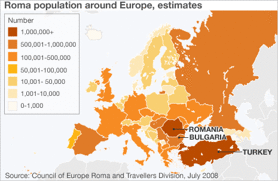Roma people in Europe[editar]
There is a consensus in the international community on using the overarching term “Roma” to refer to the distinct Roma groups and subgroups living in Europe (Roma, Sinti, Kale, Romanichels, Boyash, Ashkali, Egyptians, Yenish, Travellers, Dom, Lom, etc.). Although no official data is available, it is estimated that between 10 and 12 million Roma live in Europe, constituting its largest ethnic minority. It is spread throughout the European continent but is highly concentrated in Central and Eastern Europe, in particular Romania (est. 2 million persons), Bulgaria (est. 700,000), Hungary (est. 500,000), Slovakia (est. 450,000) the Czech Republic (est. 300,000); as well as in the Iberian peninsula (circa 700,000 Roma in Spain, and another 55,000 in Portugal).

The word Roma and the subgroups of Roma people
Like the Roma in general, many different ethnonyms are given to subgroups of Roma. Sometimes a subgroup uses more than one endonym, is commonly known by an exonym or erroneously by the endonym of another subgroup. The only name approaching an all-encompassing self-description is Rom. Even when subgroups don't use the name, they all acknowledge a common origin and a dichotomy between themselves and Gadjo (non-Roma) For instance, while the main group of Roma in German-speaking countries refer to themselves as Sinti, their name for their original language is Romanes.
Subgroups have been described as, in part, a result of the Hindu caste system, which the founding population of Rom almost certainly experienced in their South Asian urheimat.
Many groups use names apparently derived from the Romani word kalo or calo, meaning "black" or "absorbing all light" This closely resembles words for "black" or "dark" in Indo-Aryan languages (e.g., Sanskrit काल kāla: "black", "of a dark colour").Likewise, the name of the Dom or Domba people of North India – to whom the Roma have genetic, cultural and linguistic links – has come to imply "dark-skinned", in some Indian languages. Hence names such as kale and calé may have originated as an exonym or a euphemism for Roma.
Other endonyms for Romani include, for example:
Ashkali (or "Balkan Egyptians") – Albanian-speaking Roma communities in the Balkans
Bashaldé – Hungarian-Slovak Roma diaspora in the US from the late 19th century.
Calé is the endonym used by both the Spanish Roma (gitanos) and Portuguese Roma ciganos; Caló is "the language spoken by the calé".
Erlides (also Arlije, Yerlii or Arli) in Greece
Kaale, in Finland and Sweden.
Kale, Kalá, or Valshanange – Welsh English endonym used by some Roma clans in Wales. (Romanichal also live in Wales.) Romani in Spain are also attributed to the Kale.
Khorakhanè, Horahane or Xoraxai, also known as "Turkish Roma" or "Muslim Roma" – Greek Roma and Turkish Roma.
Lalleri, from Austria, Germany, and the western Czech Republic (including the former Sudetenland).
Lovari, from Hungary, known in Serbia as Machvaya, Machavaya, Machwaya, or Macwaia.
Lyuli, in Central Asian countries.
Roma in Romania, commonly known by majority ethnic Romanians as Țigani, including many subgroups defined by occupation:
Boyash, also known as Băieși, Lingurari, Ludar, Ludari, or Rudari, who coalesced in the Apuseni Mountains of Transylvania. Băieși is a Romanian word for "miners". Lingurari means "spoon makers",Ludar, Ludari, and Rudari may mean "woodworkers" or "miners".
Churari, from Romanian Ciurari, "sieve makers", Zlătari "gold smiths"
Ursari (bear trainers, from Moldovan/Romanian urs "bear")
Ungaritza blacksmiths and bladesmiths
Argintari silversmiths.
Aurari goldsmiths.
Florari flower sellers.
Lăutari singers.
Kalderash, from Romanian căldărar, lit. bucketmaker, meaning kettlemaker, tinsmith, tinker; also in Moldova and Ukraine.
Roma or Romové, Czech Republic
Roma or Rómovia, Slovakia
Romanichal, in the United Kingdom, emigrated also to the United States, Canada and Australia
Romanisæl, in Norway and Sweden.
Roms or Manouche (from manush "people" in Romani) in France.
Romungro or Carpathian Romani from eastern Hungary and neighbouring parts of the Carpathians
Sinti or Zinti, predominantly in Germany, and Northern Italy; Sinti do not refer to themselves as Roma, although their language is called Romanes.
BACK TO MAIN ‘ROMA COMMUNITY’ PAGE’






